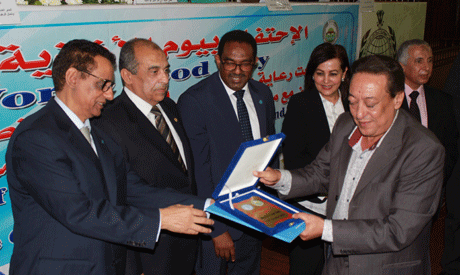
(L-r) Abdessalam Ould Ahmed, Minister Ezzeddin Abu Steit, and Hussein Gadin honour people for their efforts on WFD
Egypt's Ministry of Agriculture and Land Reclamation and the UN Food and Agriculture Organisation (FAO) marked World Food Day (WFD) under the slogan “Our Actions are our Future.”
Under the subtheme, “Zero Hunger World by 2030 is Possible," celebrations this year highlighted the importance of unified actions to address hunger and malnutrition with a view toward ending hunger within the next decade, one of the most important sustainable development goals.
On 16 October, the WFD ceremony was held under the patronage of Minister of Agriculture and Land Reclamation Ezzeddin Abu Steit and attended by Abdessalam Ould Ahmed, assistant Director-general and regional representative for Near East and North Africa, along with Hussein Gadin, FAO representative in Egypt, a large number of FAO officials and other UN agency representatives, Ministry of Agriculture officials, representatives of the Agricultural Research Centre, Desert Research Centre, and civil society, academic and media bodies.
During the ceremony, held at the premises of the Ministry of Agriculture, a FAO-produced documentary on ways to achieve zero hunger was shown. The minister of agriculture also honoured a number of people for their efforts towards this end. An exhibition of FAO publications was organised on the sidelines of the ceremony.
At the event, Minister Abu Steit noted that Egypt has made significant strides in comprehensive economic development over the past few years with a view to diversifying its sources of national income. He said the agricultural sector took the lead, benefiting from the latest technology to improve available agricultural resources and increase agricultural production while improving the quality of products to make them more competitive locally and internationally.
He disclosed that the Egyptian government turned special attention to agricultural development, offering financial incentives and constant encouragement so that future development can rely on an agricultural sector capable of meeting the needs of the growing population. As a result, he said, many investors turned to agricultural activity, with around LE 9.21 billion invested in agriculture in 2016/2017, making up 25.4 percent of total investments.
He added that the country exported LE 56 billion worth of surplus agricultural products, representing more than 22 percent of overall exports for 2017. He pointed out that 5.6 million people worked in the agricultural sector in 2017, representing more than one quarter of the Egyptian workforce.
“According to the Regional Overview on Food Security and Nutrition, around 40.2 million people in the Near East and North Africa (NENA) region suffered from malnutrition in 2017. This is why the FAO is helping the countries of the region formulate strategies and policies to address the challenges that obstruct the eradication of hunger, such as water scarcity and climate change. The FAO is also working with the member states to support production chains, nutrition, and consumption patterns that help sustain food security, improve nutrition indicators, and curb stunting, obesity, and wasting,” explained Abdessalam Ould Ahmed.
He added: “The NENA countries agreed on three regional initiatives in 2014 to improve food security, support small-scale family farming, and achieve water security. These are: the Initiative on Water Scarcity, the Initiative on Building Resilience for Food Security and Nutrition, and the Initiative on Small Scale Family Farming. We all know that 80 percent of the agricultural production in our region is produced by small holders. But 70 percent of the poor also live in rural areas. Therefore, poverty and hunger in the region cannot be eradicated without paying attention to small-scale farmers, as these play the biggest role in comprehensive rural development.”
In a speech he delivered on behalf of FAO director-general José Graziano da Silva, Hussein Gadin said: “The WFD comes this year at a critical time for the fight against hunger and malnutrition. This is the third year in which hunger continues to rise, with around 821 million people suffering from under nourishment in 2017, according to the latest report on the State of Food Security and Nutrition in the World. Conflict, extreme weather conditions linked to climate change and economic slowdown are reversing the progress that had been achieved in the fight against hunger.”
“In its message, this year’s WFD appeals to the international community to work closely together and benefit from the available guides and tools, as it is still possible to achieve zero hunger if we join forces across countries, continents, sectors, and cities during the period that remains until 2030,” he added.
Gadin said the situation and challenges Egypt is facing require more investment in agricultural and food systems, and finding better ways to adapt to other problems such as water shortages and climate change. He said the FAO can greatly contribute to such efforts.
Short link: